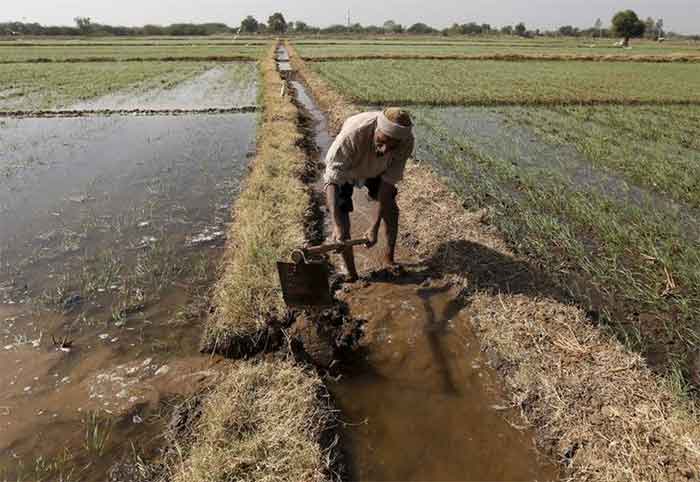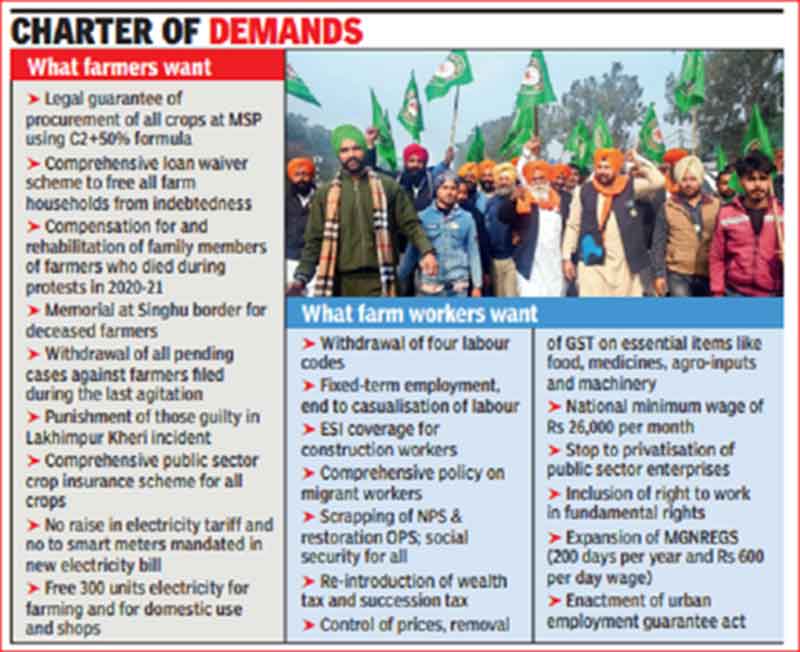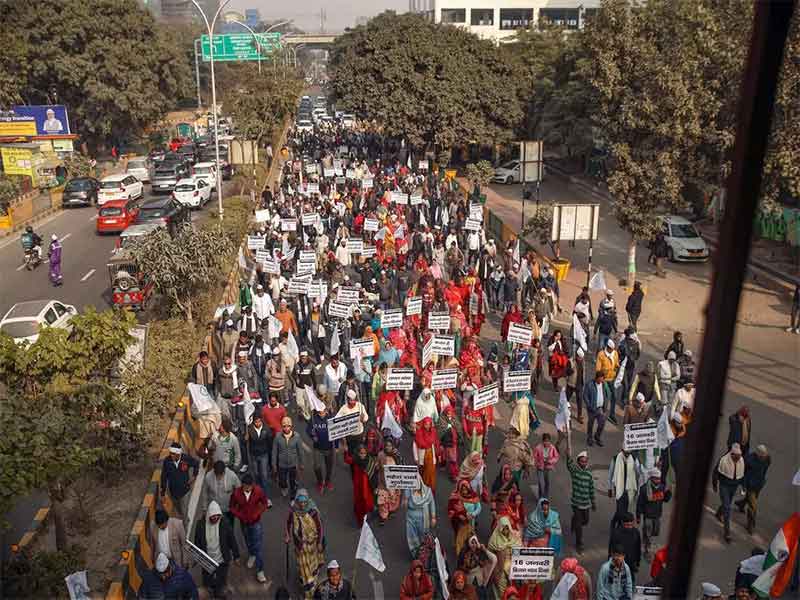
When we hear of “economic reform”, we think of policies that might make for greater growth and efficiency. However, what we often get is liberalization, privatization and globalization, all of which are aimed at facilitating large corporate players. The World Trade Organization (WTO) and Free Trade Agreements are not negotiated so much by sovereign nations as corporate interests.
Farmers, workers and backward communities end up victims of such reforms. India’s Union government brought three agriculture laws as “reform” in the agriculture sector. It was clear that these will benefit corporate retailers and large firms working in the agriculture sector like the US-based Cargill, the first company to welcome the new laws.
On August 2, 2017, Union commerce and industry minister Nirmala Sitharaman told the Parliament that the government had approved three foreign direct investment proposals in food retail, including that of e-commerce major Amazon. The government has allowed 100% FDI in food retail, making way for companies such as Amazon to sell food items on online and offline platforms.
Idli-vada from Amazon
Nothing now prevents Amazon from launching online sale of idli-vada and all types of locally manufactured food items. The government decision also allows them to start restaurants and hotels. Already, the US firm Subway has entered this sector started sale of idli-vada and pizza.
In no time, we can expect Walmart owned Flipkart to get permission to enter local food retailing. That will seriously affect small and medium retail traders; but what we do not yet realize fully is that farmers too will be adversely affected. The supply chains of these large corporate concerns are global, and they procure most agricultural products from other countries. Mexico is the biggest source of agricultural imports to the US. For Brazil, these corporate giants source material from other Latin American countries. This causes a huge impact on the domestic economies of countries where these large groups operate.
Countries from where products are procured won’t benefit either
What is noteworthy is that these corporates also do not benefit the procuring nations, because of how cheaply they procure. This is clear from the experience of Mexico. Los Angeles Times carried a report about how the hardship in Mexican farms translated into bounty on US tables. Walmart procurement had not benefited the local economy of Mexico. Farm workers conditions remains poor, as many were workers on a three-month contract. Workers got their wage at the end of the contract period, even as the law stipulated weekly payment. Even beating of workers was common in the farms.
Contractors are cruel because they seek only the maximum output from each worker; farmer or farmer companies are contracted with Walmart at the lowest price. Walmart frequently changes supplier companies, leaving the existing ones high and dry.
In their bid to sell the cheapest product, they import from abroad, reducing the domestic farm gate price. This depression of prices leaves small traders stranded, with their operations becoming unsustainable. In the end, the beneficiary is not the importing country either, but only Walmart – all others are losers. India is currently negotiating a Free Trade Agreements with USA and EU.
If global trends apply in India, and if FTAs become operational, Flipkart owned Walmart and Amazon will be able to procure from outside the country to stock their show rooms and their e-commerce platforms for catering to Indian consumers. That will seriously affect farmers and farm workers, and likely increase the number of suicides among farmers.
Share value of Reliance spikes
Reliance Retail is the biggest retailer in India with 11,784 stores, the largest Indian retailer in terms of revenue. How the laws have benefited Reliance is clear when we see the sudden increase in its share value. On June 4, 2020 the share price of Reliance was Rs1,440 after three months of the agriculture laws, on September 7, 2020, Reliance shares reached Rs 2,084. Such growth in share value had never before been seen in the history of Reliance.
Adani Group is the biggest importer and wholesale trader in agricultural products in India. The Essential Commodities Act was amended along with the two farm laws, to ensure Adani too benefited. Agriculture and retail trade are the largest employment generating sectors in the economy. Any change in these will seriously affect the whole economy, and have massive cascading effects. As was the case with the Goods and Services Tax Act, the new farm laws too will do away with differences across states, thus favouring large corporate players working across Indian states by reducing their operation costs and making for easier accounting and management.
If state laws remained, corporate bodies would need to hire state-level managers, accountants and other managerial staff. Once the tax system and the central act are adapted for automated management, costs borne by corporate houses gets reduced.
Sub-section 1(a) of Section 3 of the Essential Commodities Act (ECA) says, “The supply of such food stuffs including cereals, pulses, potato, onions, edible oilseeds and oils as the central government may, by notification in the official gazette, be regulated only under extraordinary circumstances which may include war, famine, extraordinary price rise and natural calamity of grave nature.”
In all price rise scenarios, farmers did not get any benefit. There are two reasons for sudden and huge rise in prices: Shortage and hoarding. And this will now be more easily done by corporate entities, given the legal limits to how much could be stocked no longer exist, under the laws that the farmers are protesting.
Sub-section 3 (b) of the Act states: “Any action on imposing stock limit shall be based on price rise and an order for regulating stock limit of any agricultural produce may be issued under this Act only when there is —
(i) hundred per cent increase in the retail price of horticultural produce; or
(ii) fifty per cent increase in the retail price of non-perishable agricultural food stuffs.”
The sub-section quoted above goes on: “Provided that such order for regulating stock limit shall not apply to a processor or value chain participant of any agricultural produce, if the stock limit of such person does not exceed the overall ceiling of installed capacity of processing, or the demand for export in case of an exporter.”
“Explanation – The expression “value chain participant” in relation to any agricultural product, means and includes a set of participants, from production of any agricultural produce in the field to final consumption, involving processing, packaging, storage, transport and distribution, where at each stage value is added to the product”.
Here is proof that this was meant for corporate retailers and agri-business corporations. All their activities are exempted. This explanation includes “distribution”, which means retailing. Is any doubt still left that the amendment is meant for corporate retailers?
Big retailers integrating functions
We must also consider what is happening in the retail sector. Big retailers are integrating all functions — production (through contract farming), processing, packaging, storage and transportation. This goes against the interest of small producers. Corporate retailers have processing, storage and transportation facilities; and they are now allowed to stock without limit, while farmers are not. Agri-business corporations and corporate retailers can hoard as much as they can! But farmers cannot as per the amendment. Even if farmers had wanted to stock, with their limited means and need for money, they obviously cannot hold on to stocks for long. And yet, we are told the amendments are meant to serve farmers!
Chapter 1 preliminary section 2(m) of the definitions of Farmers Produce Trade and Commerce (Promotion and Facilitation) Act, 2020, defines “trade area” – it means any area or location, place of production, collection and aggregation including (a) farm gates (b) factory premises(c) warehouses (d) Silos (d) Cold storages (f) any other structures or places, where trade of farmer’s produce may be undertaken……..
Earlier, under the state Agriculture Produce Market Committee (APMC) Act, ‘trade area’ meant only the APMC market area. This change in definition also facilitates big wholesalers like Adani and Cargill and retailers like Reliance.
Adani Group has already constructed large silos and cold storages. It has won the contract to store wheat and rice of the Food Corporation of India in its silos. As per the new law Adani silos is trade area! During the last procurement season, Hariyana government ordered the Mandi committees to close the Mandis and directed the farmers to bring the produce to the private corporates silos.
Earlier, all products had to go to the APMC market, where small traders and small wholesalers could also participate in the auction. Now all the products will go to Adani’s silos directly. The warehouses of Reliance and Cargill will also serve as ‘trade area’. It is evident that all wholesale trade of agricultural products will be controlled by big corporates. Finally, a small number of large corporates will control the whole wholesale and retail trade. What will be the future of small wholesalers and retailers ?
Corporatisation of agriculture will lead to collapse of economy
Even after thirty years of liberalisation, the growth in industry and service has not provided enough jobs. Organised sector employment growth is still very small; over 80% of all employment is in the informal sector, and we now know that “structural adjustment” is a failure.
In most of the developed countries, including the US, contract farming has led to the corporatisation of agriculture, expelling workers and changing small independent farmers into workers. In the US, industry was able to absorb some of the expelled workers from agriculture.
In the US, in 1920, 2.4 lakh farmers and 40 lakh workers were engaged in cotton farming. Corporatisation started in 1944. By 2019, only 1600 entities (including farmers and companies) were engaged in cotton farming; there were two lakh workers. In 1920, farmers were 30.2% of US population. Now it is 1.5%.
After 30 years of structural adjustment, there are no major changes in the Indian economy, and 60 per cent the labour force is still dependent on agriculture. Now the trend is automation in industry and the services sector, both of which are now shedding workers. Corporatisation of agriculture will also shed workers; what then will be the future of India? What of India’s “demographic dividend” if the majority of her youth are jobless?
In India, 58 lakh farmers are engaged in cotton cultivation and 70 lakh workers get 92 days of work per year in it. If corporatisation happens across all crops, where will these workers go? Which sector can possibly absorb such a large force of the unemployed? Already, the trends are clear.
If jobs are lost in agriculture even as job losses occur in other sectors, imagine the chaos that is bound to ensue. Automation in banking caused loss of 60,000 jobs in the year 2019. A World Bank research paper published in 2016 said, “Automation threatens 69 per cent of the jobs in India, 77 per cent in China.” Technology could fundamentally disrupt the economic paths of developing countries.
In every sector, automation is rampant. In the retail sector, it will have far reaching impact on the working class. The retail sector is a large employment-creating sector, across the world. Retail giants want to sell the cheapest products, and one way to reduce costs is to reduce labour and depend instead on automation. .
Manufacturers would earlier decide the price of products. These days, that role is performed by Amazon and Walmart. Derek Thompson, in his article ‘The Silent Crisis of Retail Employment’ reveals the current employment crisis in the retail sector in USA. Since 2016 October every month, 100,000 jobs are being lost. He says, “In an economy that will become increasingly digitized, automated, and otherwise inflected with new technologies like self-driving cars and artificial intelligence, Americans can’t get too precious about any particular job or industry.”
To describe the current issues in retail trade in the USA the term Wal-Martization is used. This term means eliminating the small players through low wage based low cost operation to monopolize the retail trade . Here in India Wal-Martization is being undertaken by Reliance in a different way employing the advantages of crony- capitalism. Wal-Martization of Indian retail by Reliance is more dangerous than what was done by Wal-Mart in the US, because it eliminates all the barriers to monopolization by colluding with the ruling party by bringing in new laws and policies, and resisting regulation, as needed. Reliance is operating both in online and offline spaces. It also collaborates with tech-giants like Facebook and Whatsapp. Reliance has already reached the number one position in retail trade in India The cumulative effect of all these is bound to cause largescale elimination of small retailers and small farmers.
It is therefore imperative that the farmers and retailers get together to fight for new policis and law to prevent the corporatization and monopolization of retail trade, which fundamentally endangers both these sectors. How is the nation going to deal with such very large scale clusure of small enterprises and establishments, and loss of income, livelihood and employment? This must worry all right-thinking people, especially the nationalists that dream of a strong India!
The social impact of e-platforms like Uber and Amazon has not yet been analysed in any depth. In cities across India, unions of ‘regular’ drivers are emerging against Uber and Ola. Even Ola and Uber drivers are forming new unions. Drivers say Ola and Uber pose an existentialistic threat, with drastic fall in their incomes. Trade unions complain that driver incomes have fallen to nearly half of what it used to be. If this is the situation now, imagine how much worse it will be when Uber launches its driverless car.
What is happening to drivers with corporate-platformisation of transport sector is a very realistic trailer of what is soon also to happen to small traders, MSMEs and farmers. Below we discuss what is happening to workers. The need of the hour therefore is for small service providers (like drivers), small traders, MSMEs, farmers and workes to all unite in a single political front to resist these changes.
Management consultancy firm Mckinsey conducted a study which found that retail is shifting towards the organised sector. In this change, it is estimated that 16 informal workers would be replaced by one formal worker. Another international consultancy, Deloitte, in its 2014 retail report, also anticipated large scale job loss when shifting from the unorganised to organised sector.
The entry of e-commerce firms into retail will also replace informal workers. E commerce enterprises generate employment in two ways – at warehouses and in courier services.
Amazon is currently researching the use of drones to supply materials to customers. In future, drones could be used to supply products to customers, at perhaps a shorter time than currently possible. This will replace the courier service man. Amazon is also automating much of warehourse work. Elon Musk has announced that Tesla will soon have ‘humanoids’ that can take over “repetitive and boring” tasks.
Google tied up with a Pune-based robot company to manufacture a robot that can manage warehouses and retail malls. Automated production, automated warehouse management and automated supply will all lead to large scale expulsion of workers. Such changes are not minor, and there is nothing inevitable about them. The question is: Are we willing to accept them? These are changes that will deeply impact labour, affect the entire economy and change humanity. We have no option but to organize, mobilize, and agitate.
Corporatization of agriculture and retail trade is likely to cause high inflation – wherever organised retailers occupied the major share of retail trade, inflation has been high. The best example of this is Britain, where 83 per cent retail is controlled by big players; UK has even witnessed violent protests against inflation. Wherever corporate retailers exist, farmers are fighting them. Mexican and US farmers are fighting against Walmart, German farmers are against Metro and other retailers.
We in India must wake to these concerns and organize our battle. Otherwise, we will have to resign to high unemployment, degraded livelihoods, and deep social unrest, as we sink deeper into debt. We have no option but to oppose, to unite as farmers, traders, MSMEs and workers and fight to assert our rights and dignity as citizens, free to write our own destiny. We can begin by boycotting all products and services of Cargill, Amazon, Subway, Flipkart, the Reliance , Adani Groups, Facebook Whatsapp and Google who invested in Reliance, payment platforms like Amazon pay and Phone Pay of Walmart . We must buy from local producers, organize to support local bakers and tailors, and assert our power to make a difference by being conscious consumers.
K V Biju, National Coordinator, Rashtriya Kisan Mahasangh














































